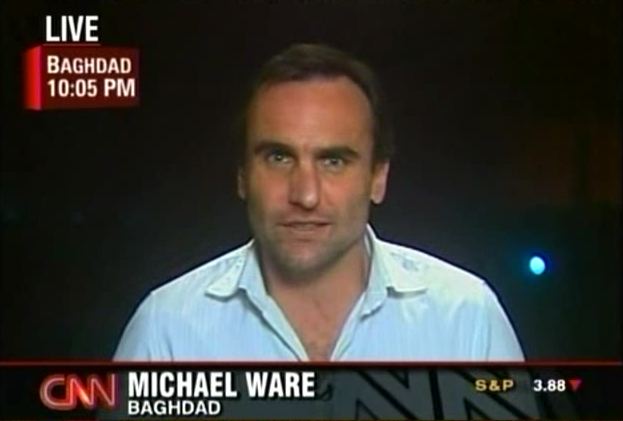NR: "took less than 36 hours to essentially steal the show."

Length: 2:43
LARGE (31.9 MB) ----- SMALL (3.2 MB)
Don Lemon throws to Michael for a final summation of the Iranian president's trip.
DON LEMON: Mahmoud Ahmadinejad has left Iraq, and he says the Americans should, too. The Iranian president has wrapped up a landmark trip in which he slammed the U.S. and virtually shunned his own security.
Let's go straight now to Baghdad and CNN's Michael Ware -- Michael.
MICHAEL WARE, CNN CORRESPONDENT: Yes, Don, that's right. The Iranian president, Mahmoud Ahmadinejad, took less than 36 hours to essentially steal the show. From the moment he landed until the moment he left, he held Iraq's attention, and also that of Washington and much of the world. In many ways, the symbolism of this trip is vital.
Certainly no major agreements were reached, although some deals were done. The importance here is that this is the first time an Iranian president has set foot in Baghdad since the Islamic Revolution in 1979, or since the invasion of Iraq by U.S. forces.
Now, this marks two successes. One, over the executed dictator Saddam Hussein, who waged a vicious eight-year war against Iran. But it also marks a perceived success by Iran against the United States.
Both countries are pursuing influence here in Iraq. And many people, including some in the U.S. mission at very senior levels, believe that Iran right now has the edge. Indeed, some very senior officials have told me in the past that of the last six years, Iran is the big winner.
Now, that's very much the way President Ahmadinejad came here. He announced his visit two weeks ago. He came on the day and the time he said he would come. He drove from the airport, didn't fly, like everyone else. He didn't hide out in the Green Zone or seek harbor in a military compound.
Instead, he was in what the Americans call the Red Zone. Such is his and his country's confidence in their influence and authority here. Indeed, this Iraqi government is made up of political parties, most of whom have direct ties to Iran, if not actually created in Iran and sent back here to Baghdad. Certainly after the invasion, it was Iranian-backed groups who filled the void.
And according to the U.S. military, Iran is backing militias who, as of the end of last year, each month, were killing more American soldiers than al Qaeda or the Sunni insurgency. These are claims that their president simply brushes away. Indeed, he says America's presence in this country is an insult to the Arab nations of the region and a humiliation, and America should just pack up now and leave. Of course, none of this is unrelated to Iran's pursuit of nuclear energy -- Don.
LEMON: Michael Ware in Baghdad. Thank you, Michael.
